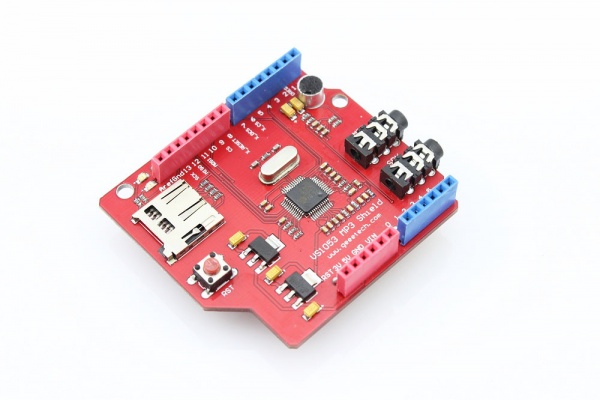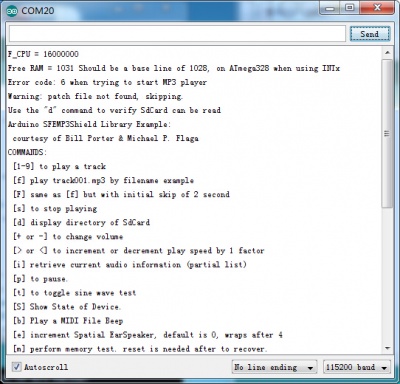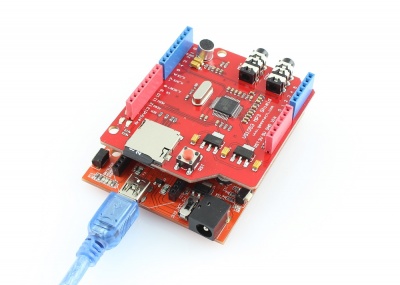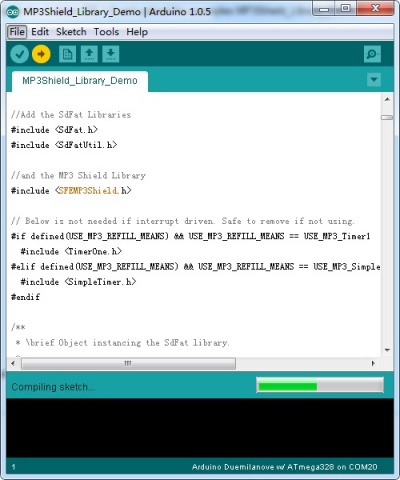VS1053 MP3 Shield
Introduction¶
The VS1053 is a great MP3 decoder, it is capable of decoding Ogg Vorbis/MP3/AAC/WMA/MIDI audio and encoding IMA ADPCM and user-loadable Ogg Vorbis, can drive 30 ohm headphones with no additional power supply. This VS1053 MP3 Shield is designed based on VS1053B from VLSI. For the best headphone listening experience, the VS1053 includes EarSpeaker spatial processing which accurately simulates how a room with stereo loudspeakers would sound. In addition to being able to decode all major formats, VS1053 is capable of recording in Ogg Vobis files. With the SD card slot on the other side of the board, you can play mp3 files from SD card using this shield. It is easily to drop it in your project or make a mp3 player using your Arduino.
Model: ASVS1053MP 
Features¶
- Can play a variety of music formats, support for OGG encoding real-time recording
- SPI interface, the control signal lines are led out
- A headphone and stereo output
- A microphone for recording
- A line_in input interface
- Power indicator
- 3.3V and 2.8V of LDO chip AMS-1117 on board, provides up to 800mA current
- A single power supply: +5 VDC
- 12.288 Mhz crystal
- SD card slot
Decodes formats¶
- Ogg Vorbis
- MP3 = MPEG 1 & 2 audio layer III (CBR+VBR+ABR)
- MP1 & MP2 = MPEG 1 & 2 audio layers I & II optional
- MPEG4 / 2 AAC-LC(+PNS), HE-AAC v2 (Level 3) (SBR + PS)
- WMA4.0/4.1/⅞/9 all profiles (5-384 kbps)
- FLAC lossless audio with software plugin (upto 24 bits, 48 kHz)
- WAV (PCM + IMA ADPCM)
- General MIDI 1 / SP-MIDI format 0
Encodes formats from mic/line¶
- Ogg Vorbis with software plugin
- IMA ADPCM
- 16-bit PCM
Usage¶
1.Plug VS1053 MP3 Shield onto the Arduino/Crowduino. Connect the board to PC using USB cable.
2.After connecting your Arduino to the VS1053 MP3 Shield, insert the SD card which stores your mp3 files with the filename like "track001.mp3", "track002.mp3" and etc into the SD card slot.
3.Download the MP3Shield Library Demo code and put them in the folder /Arduino1.0/libraries/.
4.Open the code directly by the path:File -> Examples ->SFEMP3Shield->Examples->MP3Shield_Library_Demo.
#include <SPI.h>
//Add the SdFat Libraries
#include <SdFat.h>
#include <SdFatUtil.h>
//and the MP3 Shield Library
#include <SFEMP3Shield.h>
// Below is not needed if interrupt driven. Safe to remove if not using.
#if defined(USE_MP3_REFILL_MEANS) && USE_MP3_REFILL_MEANS == USE_MP3_Timer1
#include <TimerOne.h>
#elif defined(USE_MP3_REFILL_MEANS) && USE_MP3_REFILL_MEANS == USE_MP3_SimpleTimer
#include <SimpleTimer.h>
#endif
/**
* \brief Object instancing the SdFat library.
*
* principal object for handling all SdCard functions.
*/
SdFat sd;
/**
* \brief Object instancing the SFEMP3Shield library.
*
* principal object for handling all the attributes, members and functions for the library.
*/
SFEMP3Shield MP3player;
//------------------------------------------------------------------------------
/**
* \brief Setup the Arduino Chip's feature for our use.
*
* After Arduino's kernel has booted initialize basic features for this
* application, such as Serial port and MP3player objects with .begin.
* Along with displaying the Help Menu.
*
* \note returned Error codes are typically passed up from MP3player.
* Whicn in turns creates and initializes the SdCard objects.
*
* \see
* \ref Error_Codes
*/
void setup() {
uint8_t result; //result code from some function as to be tested at later time.
Serial.begin(115200);
Serial.print(F("F_CPU = "));
Serial.println(F_CPU);
Serial.print(F("Free RAM = ")); // available in Version 1.0 F() bases the string to into Flash, to use less SRAM.
Serial.print(FreeRam(), DEC); // FreeRam() is provided by SdFatUtil.h
Serial.println(F(" Should be a base line of 1028, on ATmega328 when using INTx"));
//Initialize the SdCard.
if(!sd.begin(SD_SEL, SPI_FULL_SPEED)) sd.initErrorHalt();
// depending upon your SdCard environment, SPI_HAVE_SPEED may work better.
if(!sd.chdir("/")) sd.errorHalt("sd.chdir");
//Initialize the MP3 Player Shield
result = MP3player.begin();
//check result, see readme for error codes.
if(result != 0) {
Serial.print(F("Error code: "));
Serial.print(result);
Serial.println(F(" when trying to start MP3 player"));
if( result == 6 ) {
Serial.println(F("Warning: patch file not found, skipping.")); // can be removed for space, if needed.
Serial.println(F("Use the \"d\" command to verify SdCard can be read")); // can be removed for space, if needed.
}
}
#if defined(__BIOFEEDBACK_MEGA__) // or other reasons, of your choosing.
// Typically not used by most shields, hence commented out.
Serial.println(F("Applying ADMixer patch."));
if(MP3player.ADMixerLoad("admxster.053") == 0) {
Serial.println(F("Setting ADMixer Volume."));
MP3player.ADMixerVol(-3);
}
#endif
help();
}
//------------------------------------------------------------------------------
/**
* \brief Main Loop the Arduino Chip
*
* This is called at the end of Arduino kernel's main loop before recycling.
* And is where the user's serial input of bytes are read and analyzed by
* parsed_menu.
*
* Additionally, if the means of refilling is not interrupt based then the
* MP3player object is serviced with the availaible function.
*
* \note Actual examples of the libraries public functions are implemented in
* the parse_menu() function.
*/
void loop() {
// Below is only needed if not interrupt driven. Safe to remove if not using.
#if defined(USE_MP3_REFILL_MEANS) \
&& ( (USE_MP3_REFILL_MEANS == USE_MP3_SimpleTimer) \
|| (USE_MP3_REFILL_MEANS == USE_MP3_Polled) )
MP3player.available();
#endif
if(Serial.available()) {
parse_menu(Serial.read()); // get command from serial input
}
delay(100);
}
uint32_t millis_prv;
//------------------------------------------------------------------------------
/**
* \brief Decode the Menu.
*
* Parses through the characters of the users input, executing corresponding
* MP3player library functions and features then displaying a brief menu and
* prompting for next input command.
*/
void parse_menu(byte key_command) {
uint8_t result; // result code from some function as to be tested at later time.
// Note these buffer may be desired to exist globably.
// but do take much space if only needed temporarily, hence they are here.
char title[30]; // buffer to contain the extract the Title from the current filehandles
char artist[30]; // buffer to contain the extract the artist name from the current filehandles
char album[30]; // buffer to contain the extract the album name from the current filehandles
Serial.print(F("Received command: "));
Serial.write(key_command);
Serial.println(F(" "));
//if s, stop the current track
if(key_command == 's') {
Serial.println(F("Stopping"));
MP3player.stopTrack();
//if 1-9, play corresponding track
} else if(key_command >= '1' && key_command <= '9') {
//convert ascii numbers to real numbers
key_command = key_command - 48;
#if USE_MULTIPLE_CARDS
sd.chvol(); // assign desired sdcard's volume.
#endif
//tell the MP3 Shield to play a track
result = MP3player.playTrack(key_command);
//check result, see readme for error codes.
if(result != 0) {
Serial.print(F("Error code: "));
Serial.print(result);
Serial.println(F(" when trying to play track"));
} else {
Serial.println(F("Playing:"));
//we can get track info by using the following functions and arguments
//the functions will extract the requested information, and put it in the array we pass in
MP3player.trackTitle((char*)&title);
MP3player.trackArtist((char*)&artist);
MP3player.trackAlbum((char*)&album);
//print out the arrays of track information
Serial.write((byte*)&title, 30);
Serial.println();
Serial.print(F("by: "));
Serial.write((byte*)&artist, 30);
Serial.println();
Serial.print(F("Album: "));
Serial.write((byte*)&album, 30);
Serial.println();
}
//if +/- to change volume
} else if((key_command == '-') || (key_command == '+')) {
union twobyte mp3_vol; // create key_command existing variable that can be both word and double byte of left and right.
mp3_vol.word = MP3player.getVolume(); // returns a double uint8_t of Left and Right packed into int16_t
if(key_command == '-') { // note dB is negative
// assume equal balance and use byte[1] for math
if(mp3_vol.byte[1] >= 254) { // range check
mp3_vol.byte[1] = 254;
} else {
mp3_vol.byte[1] += 2; // keep it simpler with whole dB's
}
} else {
if(mp3_vol.byte[1] <= 2) { // range check
mp3_vol.byte[1] = 2;
} else {
mp3_vol.byte[1] -= 2;
}
}
// push byte[1] into both left and right assuming equal balance.
MP3player.setVolume(mp3_vol.byte[1], mp3_vol.byte[1]); // commit new volume
Serial.print(F("Volume changed to -"));
Serial.print(mp3_vol.byte[1]>>1, 1);
Serial.println(F("[dB]"));
//if < or > to change Play Speed
} else if((key_command == '>') || (key_command == '<')) {
uint16_t playspeed = MP3player.getPlaySpeed(); // create key_command existing variable
// note playspeed of Zero is equal to ONE, normal speed.
if(key_command == '>') { // note dB is negative
// assume equal balance and use byte[1] for math
if(playspeed >= 254) { // range check
playspeed = 5;
} else {
playspeed += 1; // keep it simpler with whole dB's
}
} else {
if(playspeed == 0) { // range check
playspeed = 0;
} else {
playspeed -= 1;
}
}
MP3player.setPlaySpeed(playspeed); // commit new playspeed
Serial.print(F("playspeed to "));
Serial.println(playspeed, DEC);
/* Alterativly, you could call a track by it's file name by using playMP3(filename);
But you must stick to 8.1 filenames, only 8 characters long, and 3 for the extension */
} else if(key_command == 'f' || key_command == 'F') {
uint32_t offset = 0;
if (key_command == 'F') {
offset = 2000;
}
//create a string with the filename
char trackName[] = "track001.mp3";
#if USE_MULTIPLE_CARDS
sd.chvol(); // assign desired sdcard's volume.
#endif
//tell the MP3 Shield to play that file
result = MP3player.playMP3(trackName, offset);
//check result, see readme for error codes.
if(result != 0) {
Serial.print(F("Error code: "));
Serial.print(result);
Serial.println(F(" when trying to play track"));
}
/* Display the file on the SdCard */
} else if(key_command == 'd') {
if(!MP3player.isPlaying()) {
// prevent root.ls when playing, something locks the dump. but keeps playing.
// yes, I have tried another unique instance with same results.
// something about SdFat and its 500byte cache.
Serial.println(F("Files found (name date time size):"));
sd.ls(LS_R | LS_DATE | LS_SIZE);
} else {
Serial.println(F("Busy Playing Files, try again later."));
}
/* Get and Display the Audio Information */
} else if(key_command == 'i') {
MP3player.getAudioInfo();
} else if(key_command == 'p') {
if( MP3player.getState() == playback) {
MP3player.pauseMusic();
Serial.println(F("Pausing"));
} else if( MP3player.getState() == paused_playback) {
MP3player.resumeMusic();
Serial.println(F("Resuming"));
} else {
Serial.println(F("Not Playing!"));
}
} else if(key_command == 't') {
int8_t teststate = MP3player.enableTestSineWave(126);
if(teststate == -1) {
Serial.println(F("Un-Available while playing music or chip in reset."));
} else if(teststate == 1) {
Serial.println(F("Enabling Test Sine Wave"));
} else if(teststate == 2) {
MP3player.disableTestSineWave();
Serial.println(F("Disabling Test Sine Wave"));
}
} else if(key_command == 'S') {
Serial.println(F("Current State of VS10xx is."));
Serial.print(F("isPlaying() = "));
Serial.println(MP3player.isPlaying());
Serial.print(F("getState() = "));
switch (MP3player.getState()) {
case uninitialized:
Serial.print(F("uninitialized"));
break;
case initialized:
Serial.print(F("initialized"));
break;
case deactivated:
Serial.print(F("deactivated"));
break;
case loading:
Serial.print(F("loading"));
break;
case ready:
Serial.print(F("ready"));
break;
case playback:
Serial.print(F("playback"));
break;
case paused_playback:
Serial.print(F("paused_playback"));
break;
case testing_memory:
Serial.print(F("testing_memory"));
break;
case testing_sinewave:
Serial.print(F("testing_sinewave"));
break;
}
Serial.println();
} else if(key_command == 'b') {
Serial.println(F("Playing Static MIDI file."));
MP3player.SendSingleMIDInote();
Serial.println(F("Ended Static MIDI file."));
#if !defined(__AVR_ATmega32U4__)
} else if(key_command == 'm') {
uint16_t teststate = MP3player.memoryTest();
if(teststate == -1) {
Serial.println(F("Un-Available while playing music or chip in reset."));
} else if(teststate == 2) {
teststate = MP3player.disableTestSineWave();
Serial.println(F("Un-Available while Sine Wave Test"));
} else {
Serial.print(F("Memory Test Results = "));
Serial.println(teststate, HEX);
Serial.println(F("Result should be 0x83FF."));
Serial.println(F("Reset is needed to recover to normal operation"));
}
} else if(key_command == 'e') {
uint8_t earspeaker = MP3player.getEarSpeaker();
if(earspeaker >= 3){
earspeaker = 0;
} else {
earspeaker++;
}
MP3player.setEarSpeaker(earspeaker); // commit new earspeaker
Serial.print(F("earspeaker to "));
Serial.println(earspeaker, DEC);
} else if(key_command == 'r') {
MP3player.resumeMusic(2000);
} else if(key_command == 'R') {
MP3player.stopTrack();
MP3player.vs_init();
Serial.println(F("Reseting VS10xx chip"));
} else if(key_command == 'g') {
int32_t offset_ms = 20000; // Note this is just an example, try your own number.
Serial.print(F("jumping to "));
Serial.print(offset_ms, DEC);
Serial.println(F("[milliseconds]"));
result = MP3player.skipTo(offset_ms);
if(result != 0) {
Serial.print(F("Error code: "));
Serial.print(result);
Serial.println(F(" when trying to skip track"));
}
} else if(key_command == 'k') {
int32_t offset_ms = -1000; // Note this is just an example, try your own number.
Serial.print(F("moving = "));
Serial.print(offset_ms, DEC);
Serial.println(F("[milliseconds]"));
result = MP3player.skip(offset_ms);
if(result != 0) {
Serial.print(F("Error code: "));
Serial.print(result);
Serial.println(F(" when trying to skip track"));
}
} else if(key_command == 'O') {
MP3player.end();
Serial.println(F("VS10xx placed into low power reset mode."));
} else if(key_command == 'o') {
MP3player.begin();
Serial.println(F("VS10xx restored from low power reset mode."));
} else if(key_command == 'D') {
uint16_t diff_state = MP3player.getDifferentialOutput();
Serial.print(F("Differential Mode "));
if(diff_state == 0) {
MP3player.setDifferentialOutput(1);
Serial.println(F("Enabled."));
} else {
MP3player.setDifferentialOutput(0);
Serial.println(F("Disabled."));
}
} else if(key_command == 'V') {
MP3player.setVUmeter(1);
Serial.println(F("Use \"No line ending\""));
Serial.print(F("VU meter = "));
Serial.println(MP3player.getVUmeter());
Serial.println(F("Hit Any key to stop."));
while(!Serial.available()) {
union twobyte vu;
vu.word = MP3player.getVUlevel();
Serial.print(F("VU: L = "));
Serial.print(vu.byte[1]);
Serial.print(F(" / R = "));
Serial.print(vu.byte[0]);
Serial.println(" dB");
delay(1000);
}
Serial.read();
MP3player.setVUmeter(0);
Serial.print(F("VU meter = "));
Serial.println(MP3player.getVUmeter());
} else if(key_command == 'T') {
uint16_t TrebleFrequency = MP3player.getTrebleFrequency();
Serial.print(F("Former TrebleFrequency = "));
Serial.println(TrebleFrequency, DEC);
if (TrebleFrequency >= 15000) { // Range is from 0 - 1500Hz
TrebleFrequency = 0;
} else {
TrebleFrequency += 1000;
}
MP3player.setTrebleFrequency(TrebleFrequency);
Serial.print(F("New TrebleFrequency = "));
Serial.println(MP3player.getTrebleFrequency(), DEC);
} else if(key_command == 'E') {
int8_t TrebleAmplitude = MP3player.getTrebleAmplitude();
Serial.print(F("Former TrebleAmplitude = "));
Serial.println(TrebleAmplitude, DEC);
if (TrebleAmplitude >= 7) { // Range is from -8 - 7dB
TrebleAmplitude = -8;
} else {
TrebleAmplitude++;
}
MP3player.setTrebleAmplitude(TrebleAmplitude);
Serial.print(F("New TrebleAmplitude = "));
Serial.println(MP3player.getTrebleAmplitude(), DEC);
} else if(key_command == 'B') {
uint16_t BassFrequency = MP3player.getBassFrequency();
Serial.print(F("Former BassFrequency = "));
Serial.println(BassFrequency, DEC);
if (BassFrequency >= 150) { // Range is from 20hz - 150hz
BassFrequency = 0;
} else {
BassFrequency += 10;
}
MP3player.setBassFrequency(BassFrequency);
Serial.print(F("New BassFrequency = "));
Serial.println(MP3player.getBassFrequency(), DEC);
} else if(key_command == 'C') {
uint16_t BassAmplitude = MP3player.getBassAmplitude();
Serial.print(F("Former BassAmplitude = "));
Serial.println(BassAmplitude, DEC);
if (BassAmplitude >= 15) { // Range is from 0 - 15dB
BassAmplitude = 0;
} else {
BassAmplitude++;
}
MP3player.setBassAmplitude(BassAmplitude);
Serial.print(F("New BassAmplitude = "));
Serial.println(MP3player.getBassAmplitude(), DEC);
} else if(key_command == 'M') {
uint16_t monostate = MP3player.getMonoMode();
Serial.print(F("Mono Mode "));
if(monostate == 0) {
MP3player.setMonoMode(1);
Serial.println(F("Enabled."));
} else {
MP3player.setMonoMode(0);
Serial.println(F("Disabled."));
}
#endif
} else if(key_command == 'h') {
help();
}
// print prompt after key stroke has been processed.
Serial.print(F("Time since last command: "));
Serial.println((float) (millis() - millis_prv)/1000, 2);
millis_prv = millis();
Serial.print(F("Enter s,1-9,+,-,>,<,f,F,d,i,p,t,S,b"));
#if !defined(__AVR_ATmega32U4__)
Serial.print(F(",m,e,r,R,g,k,O,o,D,V,B,C,T,E,M:"));
#endif
Serial.println(F(",h :"));
}
//------------------------------------------------------------------------------
/**
* \brief Print Help Menu.
*
* Prints a full menu of the commands available along with descriptions.
*/
void help() {
Serial.println(F("Arduino SFEMP3Shield Library Example:"));
Serial.println(F(" courtesy of Bill Porter & Michael P. Flaga"));
Serial.println(F("COMMANDS:"));
Serial.println(F(" [1-9] to play a track"));
Serial.println(F(" [f] play track001.mp3 by filename example"));
Serial.println(F(" [F] same as [f] but with initial skip of 2 second"));
Serial.println(F(" [s] to stop playing"));
Serial.println(F(" [d] display directory of SdCard"));
Serial.println(F(" [+ or -] to change volume"));
Serial.println(F(" [> or <] to increment or decrement play speed by 1 factor"));
Serial.println(F(" [i] retrieve current audio information (partial list)"));
Serial.println(F(" [p] to pause."));
Serial.println(F(" [t] to toggle sine wave test"));
Serial.println(F(" [S] Show State of Device."));
Serial.println(F(" [b] Play a MIDI File Beep"));
#if !defined(__AVR_ATmega32U4__)
Serial.println(F(" [e] increment Spatial EarSpeaker, default is 0, wraps after 4"));
Serial.println(F(" [m] perform memory test. reset is needed after to recover."));
Serial.println(F(" [M] Toggle between Mono and Stereo Output."));
Serial.println(F(" [g] Skip to a predetermined offset of ms in current track."));
Serial.println(F(" [k] Skip a predetermined number of ms in current track."));
Serial.println(F(" [r] resumes play from 2s from begin of file"));
Serial.println(F(" [R] Resets and initializes VS10xx chip."));
Serial.println(F(" [O] turns OFF the VS10xx into low power reset."));
Serial.println(F(" [o] turns ON the VS10xx out of low power reset."));
Serial.println(F(" [D] to toggle SM_DIFF between inphase and differential output"));
Serial.println(F(" [V] Enable VU meter Test."));
Serial.println(F(" [B] Increament bass frequency by 10Hz"));
Serial.println(F(" [C] Increament bass amplitude by 1dB"));
Serial.println(F(" [T] Increament treble frequency by 1000Hz"));
Serial.println(F(" [E] Increament treble amplitude by 1dB"));
#endif
Serial.println(F(" [h] this help"));
}
6.Open the serial monitor with the baudrate 115200, with the commands you can control it what you want.



